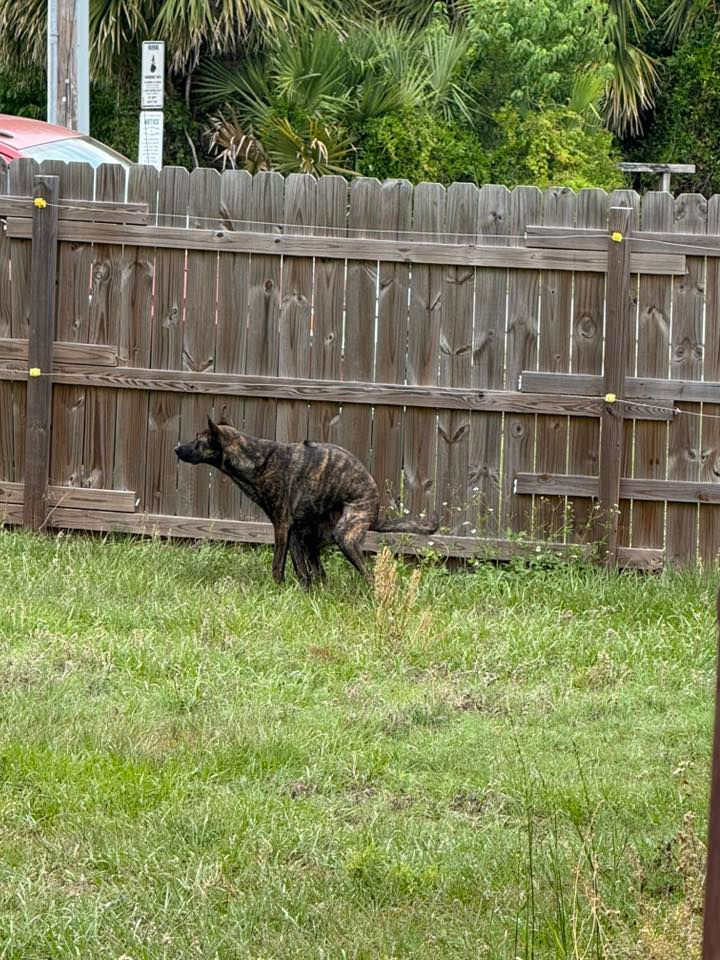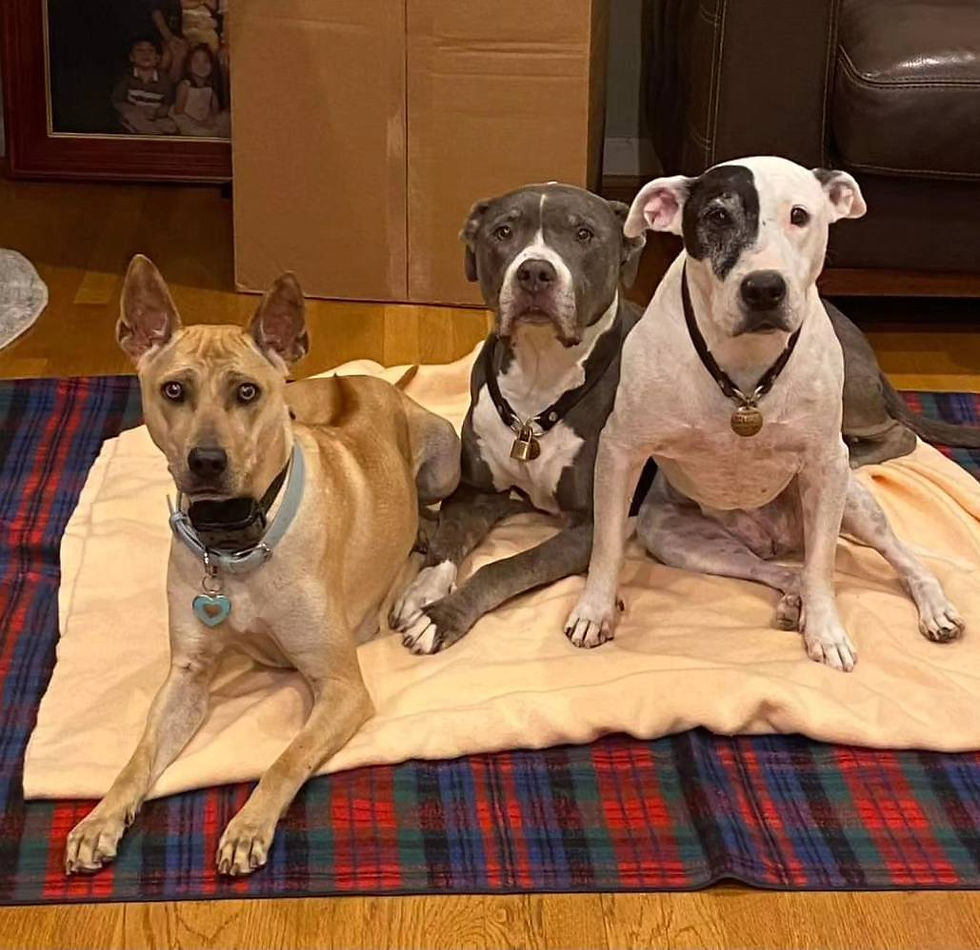Navigating the Adolescent Phase in Vietnamese Phu Quoc Ridgeback Dogs: Understanding and Overcoming Training Regression
- Phu Quoc Ridgeback Kennel Club

- Jul 18, 2025
- 7 min read

The adolescent phase in dogs is a challenging period for many owners, marked by sudden behavioral changes, defiance, and an apparent regression in training. This phase, typically occurring between 6 months and 2 years of age, can be particularly pronounced in intelligent, independent breeds like the Vietnamese Phu Quoc ridgeback dog. Known for their agility, loyalty, and strong hunting instincts, Phu Quoc dogs may seem to "forget" previously learned commands—including potty training—and exhibit stubbornness during adolescence.
In this blog, we will discuss the reasons behind this behavioral shift, its manifestations in Phu Quoc dogs, and provides detailed strategies for owners to successfully navigate this developmental stage. A special focus will be given to potty training regression, a common yet frustrating issue during this period. By understanding the biological and psychological factors at play, owners can implement effective techniques to reinforce good habits and strengthen their bond with their dog.
Understanding Canine Adolescence
1. Biological and Behavioral Changes
Adolescence in dogs is a transitional period between puppyhood and adulthood, characterized by hormonal fluctuations, brain restructuring, and increased independence. Key changes include:
Hormonal Surges: Rising testosterone in males and estrogen in females can lead to marking behaviors, decreased focus, and forgetfulness in house-training.
Brain Development: The prefrontal cortex, responsible for impulse control and habit retention, is still maturing, leading to lapses in previously learned behaviors.
Increased Independence: Dogs begin testing boundaries, sometimes ignoring cues they once followed reliably, including potty training rules.
2. Why Vietnamese Phu Quoc Ridgeback Dogs Are Particularly Challenging
The Phu Quoc dog, a rare and ancient breed from Vietnam, is highly intelligent, energetic, and bred for hunting. These traits make them:
Highly Independent: They may choose to relieve themselves wherever convenient rather than where they were trained.
Distractible: Their strong prey drive can make them forget their need to go outside until it’s too late.
Stubborn: If they were previously reliable with potty training, they may now "hold it" longer than they should, leading to accidents.
Common Adolescent Behaviors in Phu Quoc Dogs
Owners may notice the following regressions:
Ignoring Known Commands – A dog that once responded reliably to "sit" or "come" may suddenly act deaf.
Increased Destructiveness – Chewing, digging, and shredding household items may resurface.
Leash Reactivity – Lunging at other dogs, barking excessively, or pulling on walks.
Selective Hearing – Choosing when to obey based on distractions.
Potty Training Regression – Suddenly having accidents indoors despite previously being house-trained; disregarding learned elimination spots.

Understanding and Addressing Potty Training Regression
One of the most frustrating aspects of canine adolescence is when a previously house-trained Phu Quoc dog starts having accidents indoors. This can happen for several reasons:
1. Causes of Potty Training Regression
Hormonal Changes: The urge to mark territory increases, leading to indoor urination (especially in males).
Distraction & Forgetfulness: Adolescent dogs get so caught up in exploring that they ignore their body’s signals.
Testing Boundaries: They may deliberately eliminate in forbidden areas to assert independence.
Stress or Routine Changes: Moving homes, schedule disruptions, or new pets can trigger accidents.
2. How to Reinforce Potty Training
A. Re-establish a Structured Routine
Frequent Potty Breaks: Take the dog on leash to their designated area every 2-3 hours, just like during puppyhood.
Post-Meal & Playtime Trips: Always go outside on leash to designated area after eating, waking up, or intense play sessions.
Use a Cue Word: Reinforce a phrase like "Go potty" to remind them of the expected behavior.
B. Supervise and Limit Freedom
Use a Leash Indoors: If the dog starts sniffing or circling (pre-potty signals), guide them outside immediately.
Crate Training: If the dog was crate-trained as a puppy, return to using it when unsupervised.
Baby Gates: Confine them to easy-to-clean areas until reliability improves.
C. Reward Success, Avoid Punishment
Immediate Praise & Treats: Reward the dog as soon as they finish eliminating outside.
No Scolding for Accidents: Yelling can make them hide future accidents or become anxious.
Clean Thoroughly: Use enzymatic cleaners to remove odors that might attract repeat offenses.

D. Address Marking Behavior (If Applicable)
Neutering/Spaying: Can reduce hormonal marking (Neutering/Spaying should not be done until the dog is at least 14 months old).
Interrupt & Redirect: If caught mid-mark, say "Oops!" and take them outside.
Belly Bands (for Males): Temporary solution to prevent marking on furniture.
Additional Strategies for Managing Adolescent Regression in Phu Quoc Dogs
1. Reinforce Basic Training with Consistency
Adolescence is not the time to ease up on training—instead, double down.
Short, Frequent Sessions: Keep training sessions brief (5-10 minutes) but frequent (3-4 times daily).
High-Value Rewards: Use premium treats (e.g., boiled chicken, liver) to regain focus.
Re-teach Commands: If the dog "forgets," go back to basics with lure-and-reward methods.
2. Increase Mental and Physical Stimulation
A bored Phu Quoc dog is a destructive one.
Interactive Toys: Puzzle feeders, snuffle mats, and Kongs stuffed with treats.
Scent Work: Hide treats around the house or yard to engage their hunting instincts.
Agility Training: Phu Quoc dogs excel in obstacle courses, which build confidence and focus.
3. Manage Leash Reactivity and Impulse Control
Desensitization: Gradually expose the dog to triggers (other dogs, bikes) at a distance, rewarding calm behavior.
Engagement Exercises: Practice "watch me" and "leave it" commands to redirect attention.
Structured Walks: Use a front-clip harness to discourage pulling and reinforce loose-leash walking.
4. Reinforce Recall Despite Distractions
Long-Line Training: Use a 15-30 ft leash to practice recall in open spaces without losing control.
Variable Rewards: Sometimes reward with treats, other times with play or praise to maintain interest.
Never Punish a Slow Recall: If the dog finally comes after ignoring you, reward them—punishment teaches them that returning is bad.

5. Establish Clear Boundaries
Use Baby Gates or Crates: Prevent rehearsing bad behaviors (e.g., chewing shoes) by managing access.
Ignore Attention-Seeking Behaviors: Turn away if the dog jumps; reward only when all four paws are on the ground.
Teach "Place" Command: A designated mat or bed helps the dog settle when overexcited.
6. Socialization Revisited
Adolescence can bring new fears or overconfidence.
Controlled Playdates: Introduce well-mannered adult dogs to reinforce polite play.
Novel Environments: Expose the dog to different surfaces, sounds, and people to prevent fearfulness.
7. Handling Sexual Maturity (If Not Neutered/Spayed)
Male Dogs: May mark indoors, roam, or become aggressive toward other males. Increased training and supervision are crucial.
Female Dogs: During heat cycles, they may become clingy, moody or irritable. Keep them leashed to avoid unwanted attention from males. Exercise extra vigilance with other females in the house to avoid aggression and fights.

Patience and Persistence: The Key to Success
The adolescent phase is temporary but requires steadfast leadership. Phu Quoc dogs, being highly intelligent, will test limits, but consistent training will yield a well-adjusted adult.
Final Tips for Phu Quoc Dog Owners:
Stay Calm: Frustration can escalate unwanted behaviors.
Be Predictable: Dogs thrive on routine—stick to regular feeding, walking, and training schedules.
Celebrate Small Wins: Progress may be slow, but each success builds reliability.
Be Patient and Consistent: Continue training and remain consistent with rountines and discipline.
Case Study

Email from frustrated owner of Ranger in Southern California:
Ranger is getting big. It appears that Ranger is going through his teenage. He slow in eating and starting picky on food. He didn’t bother to eat this morning until I add some high value treat to it. Now he eats slowly and picks some and drops out side the bowl. We have to start training on potty all over again. Is this normal process? He has completely forgot where he supposed to #1 and 2. He went to all different spots on the grass.
Recommendations from Breed Expert Trainer Peter Lai:
If Ranger is eating slowly and picking through his food, I recommend feeding him inside his crate. Reduce his portion size slightly. When he notices there's less food, he’ll be more motivated to eat it all instead of picking at it. Feeding in the crate also limits distractions and helps him focus on eating instead of getting excited to play.
Sounds like Ranger has you figured out. He’s outsmarted you a bit. He’s learned that if he holds out or plays games with his food, something better will show up in the bowl. Honestly, I’d do the same if I could trade canned food for steak! If you want Ranger to consistently eat his kibble, start feeding him in his crate and only give him kibble—no extras. Why the crate? Because dogs naturally avoid soiling or making a mess in their living space. Over time, Ranger will associate his crate with structure and learn to keep it clean, both with food and bathroom habits. Also, skip the treats during meal time. Think of it like giving your kids candy with dinner—it only encourages them to hold out for the good stuff.
I'm pretty confident Ranger hasn’t actually forgotten where he’s supposed to go. It’s more likely that, like a teenager, he’s testing boundaries and seeking a bit of freedom. That just means it’s time to remind him of the house rules. Since he’s slipping, go back to basics. When Ranger comes out of the crate, put him on a leash and take him directly to the designated potty spot. Give him 3–5 minutes there. If he doesn’t go, bring him back inside and crate him for 30 minutes. Repeat this cycle—crate, potty spot, crate—until he pees or poops. Once he does, reward him with 2–3 hours of free/play time. After that, back to the crate for another cycle to reinforce the structure. If during that play window he has an accident or pees where he shouldn’t, calmly guide him to his crate and leave him there for 1 hour. Then resume potty refresher training. After a few repetitions—usually 3 to 6—Ranger will get the message and reset his understanding of the rules.
Final Thoughts
The adolescent phase in Vietnamese Phu Quoc dogs can be frustrating, especially when potty training regression occurs. However, by understanding the biological and behavioral shifts, owners can adjust their training methods to reinforce good habits. Consistency, patience, and engaging the dog’s natural instincts are crucial in guiding them through this phase. With the right approach, a Phu Quoc dog will emerge as a disciplined, loyal, and well-balanced companion, fully embodying the remarkable traits of this unique breed.
Key Takeaways:
✔ Adolescence is temporary but requires proactive training.
✔ Potty training regression is common—reinforce routines and supervision.
✔ Phu Quoc dogs need mental and physical challenges to stay engaged.
✔ Consistency in commands and boundaries prevents long-term bad habits.✔ Positive reinforcement builds trust and reliability.
By embracing this phase as an opportunity for deeper bonding and advanced training, owners can help their Phu Quoc dogs transition smoothly into well-mannered adulthood.






Comments